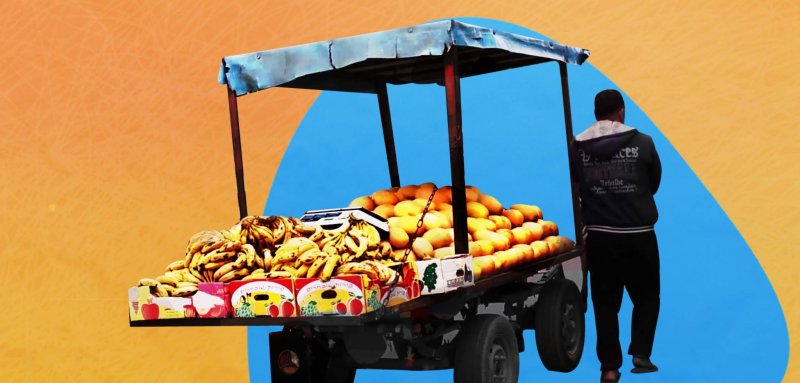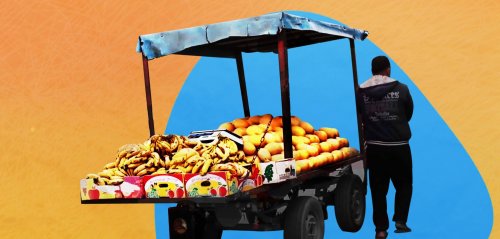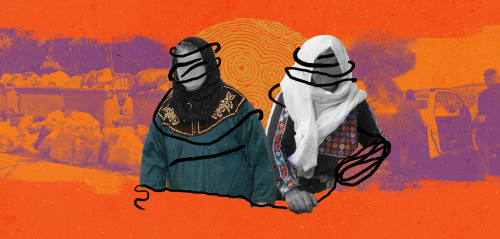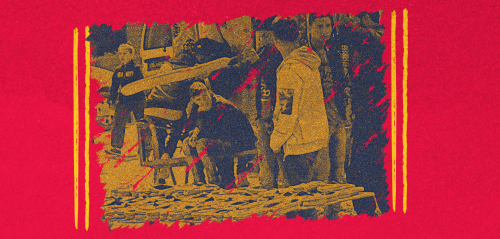The story of street vendors in Tunisia is a complex one, as it reflects both the challenges of economic opportunity and the need for greater protections for some of the most vulnerable members of society. The past few months have seen events that have brought renewed attention to the difficult and often dangerous conditions that street vendors in Tunisia face.
September 24 was not an ordinary day in the life of young Tunisian Mohamed Amine Dridi and his family. The simple young man who woke up every morning to chase after his livelihood, by selling vegetables on a small cart in the Mornag area of Ben Arous Governorate, suddenly made headlines. In a symbolic event that brought to mind what Mohamed Bouazizi did years ago, announcing the outbreak of a popular revolution in Tunisia and then the Arab world, Mohamed Amine ended his life by hanging himself after municipal employees confiscated the scale he uses in his work, according to his uncle's account to the media.
The victim's uncle said that the family financially supported the young man to enable him to buy a cart for selling vegetables, but that municipal agents were confiscating his scale every day and issuing reports against him. On the morning of September 24th, he called his father to inform him that they had yet again seized his work tools, and when he returned home, he found his son hanged.
The suicide incident was followed by popular protests in several areas, in Mornag and Manouba in the capital, to condemn the violations, harassment, and high prices, revealing some of the suffering of street vendors in Tunisia.
Harassment.. An endless nightmare
Ramzi, a street vendor from the city of Kairouan, spoke to Raseef22 about the difficulty of his work in light of the current situation the country is going through, including an economic crisis and a shortage of goods. He says that relying on a "nasbah" (a cart to display various goods such as plastic utensils, kitchenware and small electronic devices) to provide a stable income to cover his needs, is definitely not easy.
The seller said that his profession "is a job that provides me with basic needs, and I cannot rely on it to provide a decent or stable income." He adds, "I have lived my life between poverty and the fear of being in need. I spend my current days stuck between two obsessions: rising prices and escaping the pursuit of municipal agents."
In a symbolic event reminiscent of what Mohamed Bouazizi did years ago, announcing the outbreak of a popular revolution in Tunisia, Mohamed Amine ended his life by hanging himself after municipal employees confiscated the scale he uses for his work
Ramzi does not hide his annoyance at the harassment that municipal agents subject him to. What he fears most is that they will confiscate his goods, which will cost him the trouble of buying new goods to continue working and makes him lose a significant portion of the small amount of money he has.
Faced with limited options, he finds himself forced to continue this grueling work, as it is better than unemployment and theft, he stresses, insisting that he is looking forward to emigrating. He recounts with enthusiasm that his neighbor, who works like him, has finally succeeded in reaching Italy through legal migration by crossing the Mediterranean Sea.
Tunisian authorities have one eye closed when it comes to dealing with roaming street vendors, sometimes pursuing them, and at other times allowing them to make a living within reasonable limits.
Despite the economic crisis and living difficulties, the parallel economy remains illegal and harms the country's economy because it does not pay taxes, which is one of the most important government sources, and harms regular traders.
Chaotic trade after the revolution, and the display of goods on the roadsides, near cafes and on sidewalks, had also become a worrisome phenomenon that is disturbing the comfort of passers-by.
Civil society activists are calling on the government to provide places for these merchants and to build organized and divided markets where they can display their goods within the law.
The weakest link in the smuggling network
Ramadan Ben Amor, a member of the Tunisian Forum for Economic and Social Rights, stated that the phenomenon of parallel trade, or what we call the parallel economy, has become part of the structural crisis of the national economy, adding to Raseef22 that street vendors, who operate illegally, do not pay taxes, and offer smuggled goods for sale, are citizens that have been excluded by the official economic system.
Tunisian authorities have one eye closed when it comes to dealing with roaming street vendors, sometimes pursuing them, and at other times allowing them to make a living within reasonable limits
Ben Amor faults the authorities for limiting their dealings with them to the punitive aspect, through campaigns targeting them and seizing their goods.
He points out that the largest number of street vendors is in the capital, as this type of trade provides a certain type of goods that is mainly linked to the reality of the purchasing power of Tunisians, which declined after the revolution.
He adds that the state does not have a comprehensive vision to address the phenomenon, calling for the creation of a new dynamic and an economic alternative for them.
Ben Amor confirms that the forum has received several complaints about extortion by employees (requests for bribes), and pressure exerted on vendors by municipal and customs agents.
The member of the Tunisian Forum for Economic and Social Rights added that the ambitions and aspirations of most of these vendors, who are young people, has become limited to emigrating. Although their work is part of a large and powerful smuggling ring, the authorities limit their role to chasing vendors only in some type of display, while ignoring the protection of the borders, which are the source of the smuggled goods, and chasing the intermediaries who deliver the goods to the small vendors.
A threat to the national economy
In a statement to Radio Mosaïque on September 9, 2022, economist Ezzedine Saidane warned that the parallel economy in Tunisia has taken a terrible and dangerous form, especially since some estimates indicate that it has reached 50% or more of the size of the overall economy, which is a very large risk to economic life in general, and to the role of the state in the economy in particular.
Civil society activists are calling on the government to provide places for these merchants and to build organized and divided markets where they can display their goods within the law
Saidane pointed out that the parallel economy has been worsening in this way from 2011 until today, as the weakness of the central authority led to the emergence of another force, to smuggling and the so-called smuggling tycoons who have found the opportunity to make quick profit. He added that the government must develop a clear vision and program to return the bulk of the parallel economy to the formal economy.
Raseef22 is a not for profit entity. Our focus is on quality journalism. Every contribution to the NasRaseef membership goes directly towards journalism production. We stand independent, not accepting corporate sponsorships, sponsored content or political funding.
Support our mission to keep Raseef22 available to all readers by clicking here!
Interested in writing with us? Check our pitch process here!







